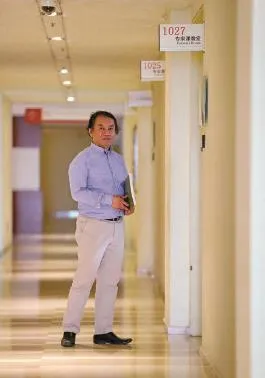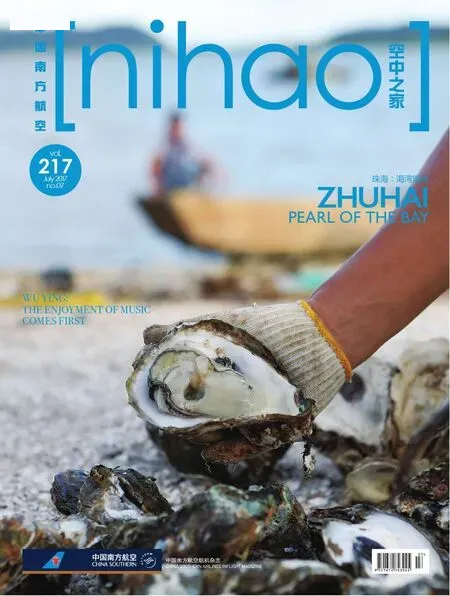WU YING THE ENJOYMENT OF MUSIC COMES FIRST
Text by Chen Yuqiang Translation by Leo Photos by Zeng Jian, Han Jun
WU YING THE ENJOYMENT OF MUSIC COMES FIRST
Text by Chen Yuqiang Translation by Leo Photos by Zeng Jian, Han Jun
From the day he was born, Wu Ying has been closely bound to the Central Conservatory of Music (CCOM), a leading music school in China. The courtyard into which he was born was once the mansion of a duke in Qing Dynasty (1644-1912) and later a concert hall of the school. It is not only his birthplace and his alma mater, but also where he has been willing to devote himself to achieving his life goal in education.
Pro. Wu has a head of hair like Beethoven's. While performing or teaching, his curly hair waggles rhythmically in the air like Seiji Ozawa's baton. And his big hands, which are typical for a pianist, sometimes curl into fi sts showing strength and sometimes leisurely stretch manifesting relaxation. His sparkling eyes keep shining wisdom and energy to the student. In such a one-to-one lecture, often seen are splendid joint piano performances.
At the age of fi ve, Prof. Wu began learning piano with his father Wu Zuqiang, a composer and his mother Zheng Liqin, a pianist. After graduation with a Master's Degree from CCOM in 1976, he went to study in Austria, where he learned from Paul Badura-Skoda, a master pianist. After his return to China, he chose to teach in his alma mater. In his journey of growth, overseas study and return, Prof.

Wu Ying's Milestones
In 1976, Mr. Wu fi nished his study at the Piano Department of Beijing-based Central Conservatory of Music (CCOM).
In 1980, he won the fi rst prize in a national piano qualifying competition.
In 1982, he earned his Master's Degree from CCOM; in the same year, he gave a live concert at the BBC.
In 1984, he graduated from the Vienna Conservatory where he studied under Professor Paul Badura-Skoda; then he went back to teach at CCOM.
In 1985, he gave a piano recital at the George Enescu Festival in Romania and at the Chopin Festival in Poland, and was invited by the Fryderyk Chopin Society in Poland to hold concerts at Lazienki Park, Warsaw.
In 1991-92, he was granted a Special Contribution Award by the State Council and the State Education Commission of China, and won the Paul Badura- Skoda Award from the Johann Wolfgang von Goethe Foundation in Switzerland.
In 1994-2004, he served as professor and head of the Piano Department of Shanghai Conservatory of Music, and was recognised as an outstanding expert by the Ministry of Culture of China.
In 2005, he started to work as head of the Piano Department of CCOM, and became a member of the Expert Committee under the Ministry of Culture; he was also honoured as an excellent educator .
Wu life is intertwined with the music school. There, he has been using his lifeblood to nourish new generations in order to fulfi ll his life goal of cultivating top pianists.
As the supreme musical academy in China, CCOM only admits a maximum of 20 undergraduate students each year into its Piano Department. At the postgraduate level, less than ten students graduate from the department each year. Most of these graduates enter music academies across China to teach piano, passing down their years of learning to the next generation.
After nearly a century of development from the 1920s, piano education in China has immensely improved. However, only a few can become professional pianists. If the music students are at the bottom of a pyramid, then those who become professional musicians are at the very top of it. Only the best of the best pianists go professional.
The situation in China is even severer than that abroad. According to Prof. Wu, there are not many professional pianists in China, partly because the classical music market in China has not been fully developed yet. In contrast to popular music, classical music has yet to be appreciated by a larger audience and to be served by more performance agencies. More importantly, an wellestablished brokerage system still lacks in China. In some foreign countries, professional pianists with a broker can make a decent living by performing. In contrast, most of the professional pianists in China, still few in number, teach and perform.
As a pianist and professor, Prof. Wu is often asked during his performances and interviews about his opinions on the piano education in China. He does not fully agree on some viewpoints. “Some blame piano training schools, citing their incompetency and greed. Though this is partly true, there is no denying that some serious training institutions with qualifi ed training competency do contribute to the next generation in their musical fondness.”
According to Prof. Wu, there are two categories of piano education outside formal music academies. One is provided by piano training institutions aiming to cultivate hobbies, while the other is offered by educators with professional music background aiming to cultivate professionals. Instructors in the fi rst category are music fans or those with a background of infant music education, who strive to foster musical fondness. The second category of education providers has relatively good professional background and is established specifi cally to prepare professional talent for conservatories.
After all, only a few succeeded as professional pianists. “Success is a result of both natural endowments and circumstances. The natural endowments include physical conditions, like fi ngers, fi gure, body coordination, musical senses and thinking abilities, while the circumstances also matter,” said Prof. Wu. The journey of a professional pianist is full of hardship. However, it is within everyone's reach to become fond of music.

